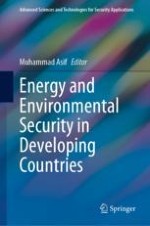Abstract
Energy security has evinced a prime role in shaping prospects of economic and social development with its intrinsic relationship with environmental security due to convergence of energy generation and distribution with so many factors like global governance, economic development, affordability, equitable and sustainable energy transitions, environmental protection, environmental politics, water security, air pollution, climate change, conflicts, and environment-induced migrations. Pakistan has energy requirements of more than 75 million tons of oil equivalent (MTOE) in 2019 which is experiencing exponential increase due to growing population and changing lifestyle. The country is currently relying on thermal energy and imported fossil fuels to meet energy requirements. The share of coal in primary energy has been increased in recent years. The construction and operational phase of energy projects have significant threats to environmental security due to soil erosion and compaction, chemical spills and debris disposal, air emissions, noise and wildfire. It also shapes the terrain by damaging vegetation cover, terrestrial ecosystems and wetlands. The impacts further include dislocation of species, disturbance in migratory corridors and changes in breeding areas of wildlife. These projects also affect the water quality and modify drainage patterns causing aesthetic disruption and changes. Archeologically and culturally important sites are also being disturbed on the pretext of improving socio-economic conditions. Furthermore, climate change is reshaping the nexus of energy with environmental security in Pakistan. Resultantly, there may be a paradigm shift due to energy insecurity, geopolitical conflicts in the region, consumer’s access to affordable energy, environmental injustice and insecurity. Pakistan already lacks renewable energy but inefficient use, line losses, energy-inefficient infrastructure and technologies challenge the government to meet the targets of Sustainable Development Goals (SDG 7), pillar 4 (Water, energy and food security) of the Pakistan Vision 2025. Hence, Pakistan has to establish a good framework of governance for thermal power sector, upgrade its existing energy infrastructure, diversify energy recourses, introduce energy-efficient technologies, develop minimum standards for power generation, explore renewable and competitive energy market, identify low carbon power generation methods, subsidize alternative and renewable energy (ARE) technologies, balance energy mix, improve fuel efficiency, manage energy demand, invest on research and development, aware the people and regulate consumer’s behavior and practices to achieve optimum energy security and environmental security.
